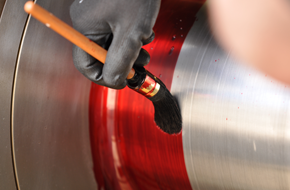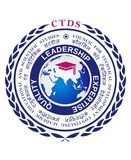 Liquid penetrant inspection is a nondestructive test method which does not harm the samples or parts being inspected. The test is very effective in detecting porosity, cracks, fractures, laps, seams and other flaws that are open to the surface of the test piece and may be caused by fatigue, impact, quenching, machining, grinding, forging, bursts, shrinkage or overload. As a result, it is often used on lots of machined parts, as well as weldments, manufactured products, castings, forgings and other items that will be placed into service.
Liquid penetrant inspection is a nondestructive test method which does not harm the samples or parts being inspected. The test is very effective in detecting porosity, cracks, fractures, laps, seams and other flaws that are open to the surface of the test piece and may be caused by fatigue, impact, quenching, machining, grinding, forging, bursts, shrinkage or overload. As a result, it is often used on lots of machined parts, as well as weldments, manufactured products, castings, forgings and other items that will be placed into service.
Liquid penetrant inspection can be used successfully on nonporous and fairly smooth materials such as metals, glass, plastics and fired ceramics. This test is named for the liquid, called penetrant, that is applied to the sample during testing in order to make any surface flaws more visible.hvac course in coimbatore
A variety of penetrant materials are available and selection is often based on the required sensitivity level of the test, equipment available at the test site to conduct the test and other factors:hvac course in coimbatore
Developers may be applied by dusting with a dry powder or spraying a wet developer.hvac course in coimbatore
The Process : The testing process can be broken down into the following distinct steps:
1. Pre-cleaning The very first step is a thorough surface cleaning to be sure the test piece is free of oil, grease, water, heat-treat scale, paint, plating and other contaminants that may prevent liquid penetrant from entering flaws. A solvent is often used for this step, but the test sample may require steam, vapor, chemical or ultrasonic cleaning. Parts that have been machined, sanded or grit-blasted may require etching to remove material that could be block the opening of the flaw and prevent the penetrant from entering.hvac course in coimbatore
2. Penetrant application Both the visible and fluorescent dye penetrants can be applied to the test sample by spraying, brushing or immersing the part in a penetrant bath. The choice of application is usually a matter of preference, but can be influenced by the size and shape of the test piece, the equipment available for conducting the test or the requirements of the test specification(s) applicable to the samples.hvac course in coimbatore
3. Penetrant dwell time The liquid penetrant is left on the surface for a sufficient time to allow the liquid to seep into any surface openings or defects. The total time that this liquid is in contact with the surface of the sample is called the penetrant dwell time. hvac course in coimbatore
Dwell time varies for different types of penetrants and is generally dictated by the test specifications called out for the testing. The surface finish, temperature and type of the material also will affect dwell requirements. hvac course in coimbatore
4. Penetrant removal After the dwell time has elapsed, the excess liquid penetrant is carefully removed from the surface to avoid removing any of the captured penetrant from the flaw or defect. When working with a visible dye, excess penetrant is usually removed with a solvent (solvent-removable). Excess fluorescent dye may be water-washable and rinsed with water or emulsifiable-post and first treated with an emulsifier before rinsing. When using the water-washable or post-emulsifiable methods, the part is placed in a low-temperature oven and allowed time to dry before applying the developer. hvac course in coimbatore
5. Developer application A thin layer of developer is applied to the part to assist in drawing penetrant trapped in flaws back to the surface where it will be visible as indications. Developers may be applied by dusting with a dry powder or spraying a wet developer. The resulting indications are larger than the actual flaw and have a high level of contrast between the penetrant and developer, making them more visible to aid in inspection.
6. Developer dwell timeThe developer remains on the sample piece for the required amount of time stated in the test specification to allow indications to develop prior to inspection. hvac course in coimbatore
7. Inspection The inspection process is performed by trained and certified inspectors using a visual examination. When working with fluorescent penetrants, indications must be viewed under darkened conditions with a high-intensity UV lamp or black light. Testing with a visible dye requires sufficient white light. The sample will be accepted or rejected based on the specification or acceptance criteria followed for the order. The inspector also will attempt to determine the origin of the discontinuity. hvac course in coimbatore
8. Post-cleaning The final step in the process is to thoroughly clean the surface of the sample to remove any penetrant testing residues.
Test pieces drying in oven :
Both the visible and fluorescent dye penetrants can be applied to the test sample by spraying, brushing or immersing the part in a penetrant bath. Source: Laboratory Testing Inc.hvac course in coimbatore
Liquid penetrant inspection is a relatively fast, easy and inexpensive means of surface inspection. Large quantities of parts or materials can be inspected quickly. Parts of almost any shape and size can be inspected, although the capacity of equipment and the facility used for testing can create limitations. This type of testing can be performed on most materials that are not extremely rough or porous. This process is nondestructive so the test samples are not damaged during testing. LPI is highly sensitive to small surface discontinuities. Indications are produced directly on the surface of the part and provide a visual representation of the flaw.
One of the major limitations of a penetrant inspection is that flaws must be open to the surface. Also, surface finish and roughness can affect inspection sensitivity. Pre-cleaning of parts is critical since contaminants can mask defects, and post-cleaning is required to remove residues.





